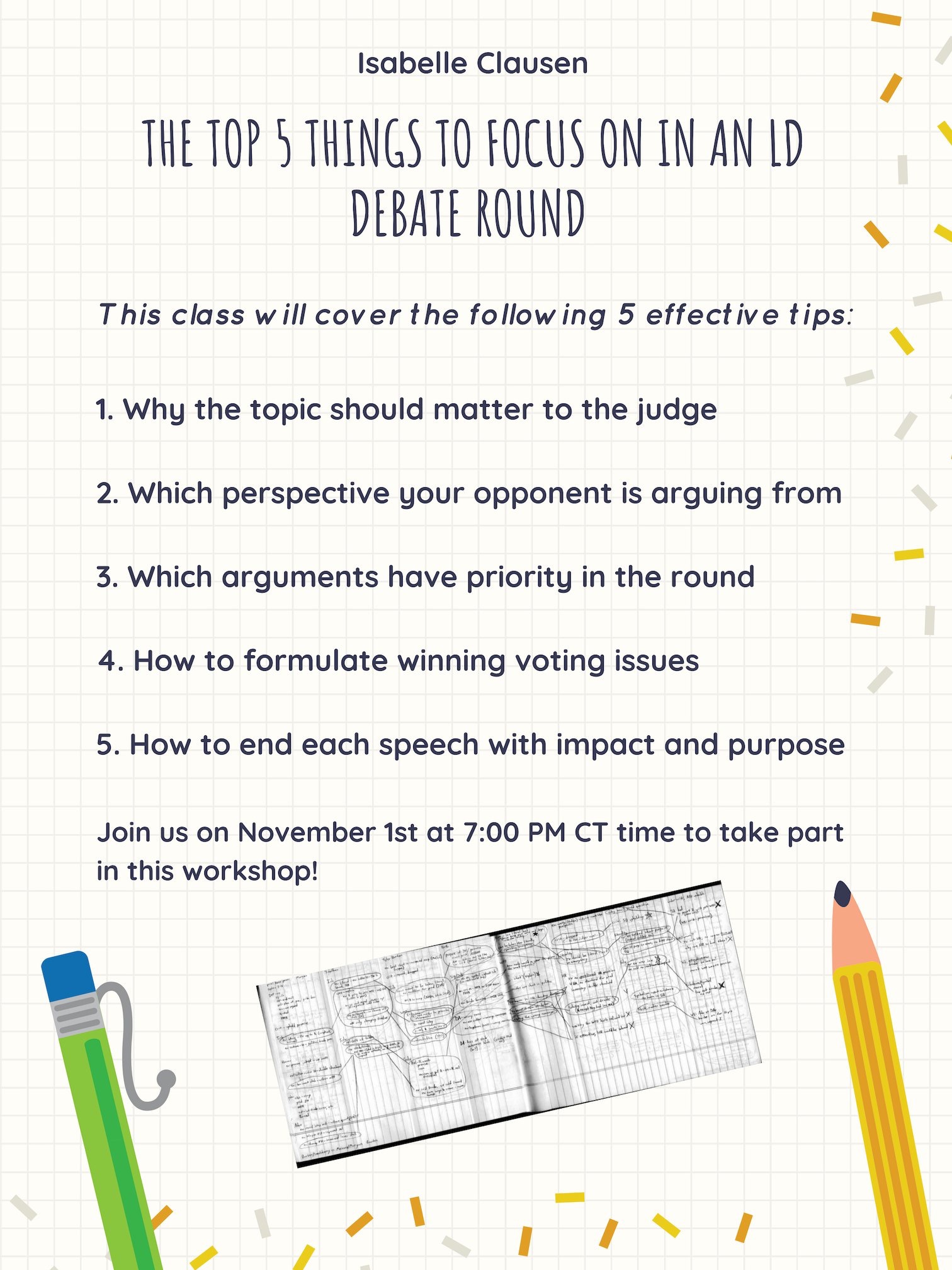
Have you ever walked into a debate round wondering in the world are you doing? Have you ever walked out of a round thinking you won that round, but ended up pathetically losing? Or have you ever walked out of a round thinking that you lost pathetically but actually won by a huge margin?
I’ve been there before, feeling inconsistent in my debate rounds, not knowing how I won or lost. We either go through a debate round feeling rushed and nervous, or confident and pragmatic. But regardless of how we feel, sometimes the judge votes for what we least expected. Why is this? Why can’t we find consistency in our competition? How is it that the really good people keep on winning tournament after tournament and we are just chilling here getting 3-3?
If you’re in this boat and want more consistency in your debate rounds, then I have 5 tips to share with you that will lead you down a more successful path! Join me, on Thursday for my LD Online Workshop, or keep reading…
The 5 tips I will be covering in my LD workshop are as follows:
1. Why the topic should matter to the judge.
Oftentimes students forget that the person they are supposed to persuade is the judge, not their opponent. What students have to realize that while they can never get their opponent to agree with them, they can get their judge to side with them. This is why it is important to relate the topic to the judge. In order for the judge to see the topic from your point of view, they have to care about the topic first. In this workshop, I will be teaching students how to focus less on persuading the opponent, and how to focus more on persuading the judge by relating the topic to the judge.
2. Which perspective your opponent is arguing from.
Although you are supposed to focus on persuading the judge rather than your opponent, it is vital that you understand the perspective your opponent is coming from. In order to attack your opponent’s argument at its heart, you must determine their point of view. Are they looking at this topic from the point of view of a world leader? A civilian? A lawyer? A highschooler? A homeschool mom? Your opponent can use any point of view, but it’s your job to figure out what that point of view is. In this workshop, I will be teaching why this is so important, as well as how you can use this knowledge to leverage your refutations in the debate round.
3. Which arguments have priority in the round.
As you probably know, debate rounds contain countless arguments. Most of the time, it is impossible to fully explain and refute ALL of the arguments in all of the speeches within the round. Because there are so many arguments and so little time, you have to learn how to pick and choose which arguments to discuss. Every round will have different arguments, and each argument will have a certain level of importance that varies in every round. As a debater and communicator, it’s your job to explain to the judge which arguments have more or less value. In this workshop, I will teach you how to strategically drop arguments, group arguments, and figure out how to determine which arguments have the most weight in the round.
4. How to formulate winning voting issues.
Voting issues really tie up your debate round. Oftentimes, even if a student has a bad round, they can still win if they execute their voting issues well. Not only should voting issues share why you should win, but they also should share what the round is about. So many students forget that voting issues need to inform and remind the judge about what the round is discussing. Likewise, students need to understand that not every round will have the same type or number of voting issues; voting issues are fluid and flexible for every round. This workshop will teach you how to create voting issues that will inform, remind, and compel the judge to vote for you. During this workshop, I will give you templates on how to create certain voting issues depending on what you are trying to prove.
5. How to end each speech with impact and purpose.
After you share you constructives, your rebuttals, and your voting issues, you need to allocate yourself enough time after each speech to end on an impactful note. These include relating to your judge, relating your speech back to the value, and sharing why your side upholds the value better. This workshop will teach you how to not run out of time and instead end on a confident and impactful note rather than a rushed and frazzled one.
This workshop is catered to both NCFCA and STOA debaters. Although I will briefly discuss each league’s debate topic for the year, I will primarily be teaching about the skills of debate rather than the topics. My hope is that after you take this workshop, you will be able to apply all of these tips to any debate round, regardless of the topic!
If you are looking for consistency and success in your debate rounds, I encourage you to come to my class on November 1st at 7:00 PM CT. I can’t wait to see you there! 🙂